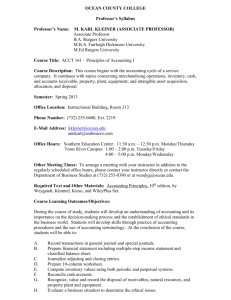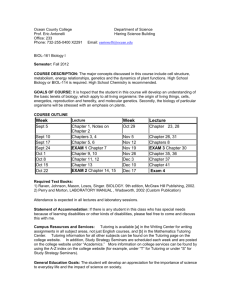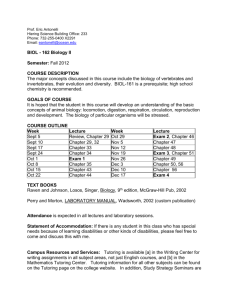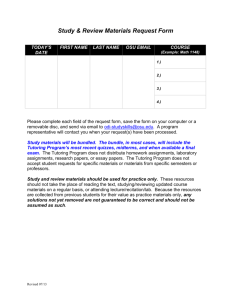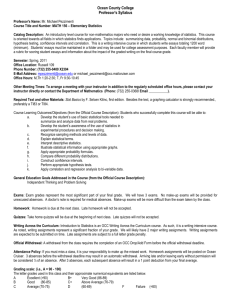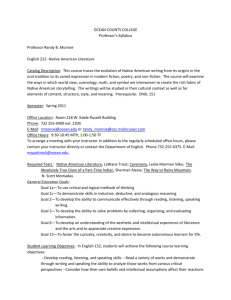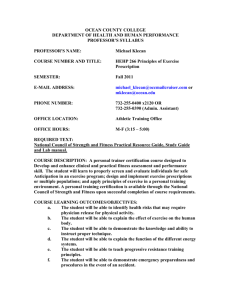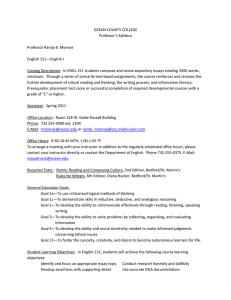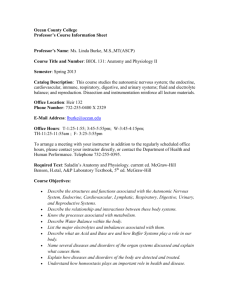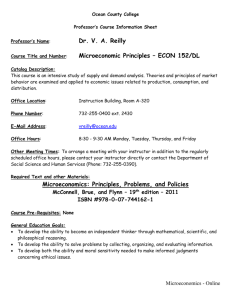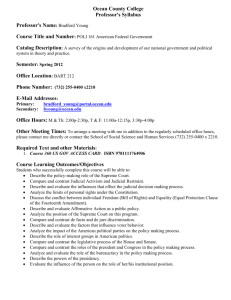ECON 151 - Ocean County College
advertisement
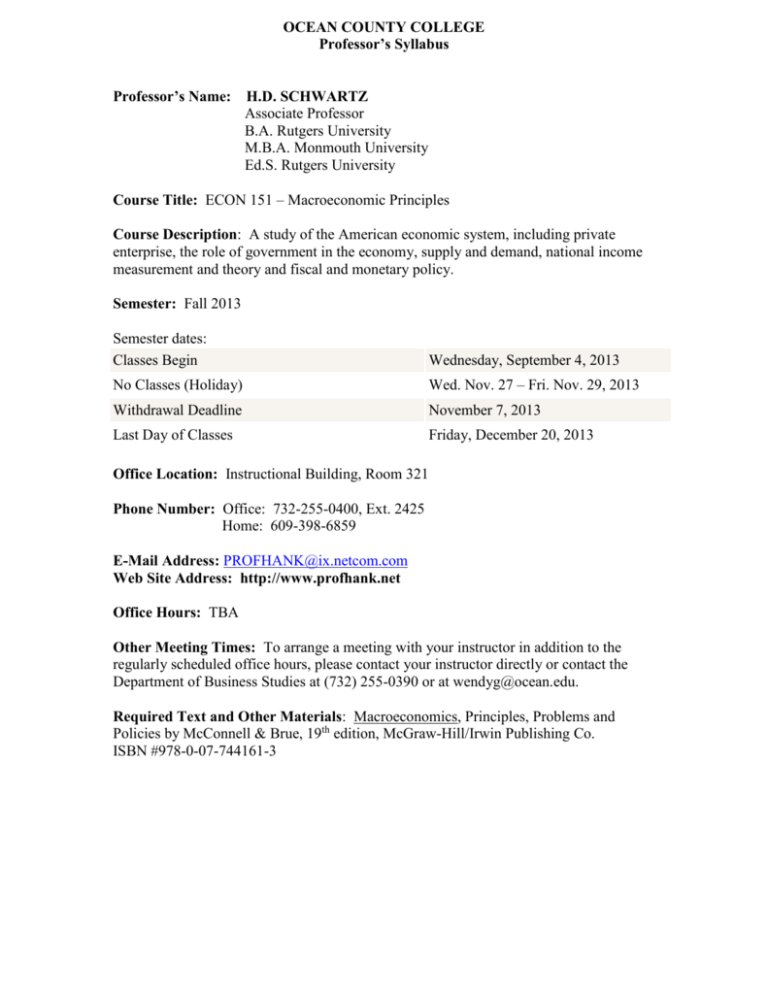
OCEAN COUNTY COLLEGE Professor’s Syllabus Professor’s Name: H.D. SCHWARTZ Associate Professor B.A. Rutgers University M.B.A. Monmouth University Ed.S. Rutgers University Course Title: ECON 151 – Macroeconomic Principles Course Description: A study of the American economic system, including private enterprise, the role of government in the economy, supply and demand, national income measurement and theory and fiscal and monetary policy. Semester: Fall 2013 Semester dates: Classes Begin Wednesday, September 4, 2013 No Classes (Holiday) Wed. Nov. 27 – Fri. Nov. 29, 2013 Withdrawal Deadline November 7, 2013 Last Day of Classes Friday, December 20, 2013 Office Location: Instructional Building, Room 321 Phone Number: Office: 732-255-0400, Ext. 2425 Home: 609-398-6859 E-Mail Address: PROFHANK@ix.netcom.com Web Site Address: http://www.profhank.net Office Hours: TBA Other Meeting Times: To arrange a meeting with your instructor in addition to the regularly scheduled office hours, please contact your instructor directly or contact the Department of Business Studies at (732) 255-0390 or at wendyg@ocean.edu. Required Text and Other Materials: Macroeconomics, Principles, Problems and Policies by McConnell & Brue, 19th edition, McGraw-Hill/Irwin Publishing Co. ISBN #978-0-07-744161-3 Course Learning Outcomes/Objectives: McConnell & Brue’s Fundamental Objectives: Help the beginning student master the principles essential for understanding the economizing problem, specific economic issues, and the policy alternatives. Help the student understand and apply the economic perspective and reason accurately and objectively about economic matters. Promote a lasting student interest in economics and the economy. 1. Define economics 2. Explain the importance of ceteris paribus in formulating economic principles 3. Identify independent and dependent variables 4. Provide an economic vocabulary 5. Define the economizing problem 6. Explain the concepts of allocation and productive efficiency. 7. Show relationship between investment and economic growth. 8. Understand the Law of Supply and Demand 9. Define and understand market dynamics. 10. Explain functional distribution of income. 11. Explain durable and nondurable goods and services 12. Explain government’s effects on income distribution and competition. 13. Explain a “public good”. 14. Identify four types of flows linking nations. 15. Discuss imports, exports and the balance of payments. 16. Explain factors affecting foreign exchange. 17. Explain GDP,NDP,NI,PI,DI 18. Describe and explain business cycle. 19. Discuss unemployment and unemployment rate. 20. Discuss effect of inflation on output and employment. 21. Explain fiscal policy. 22. Explain monetary policy 23. Discuss definitions and functions of money. 24. Define M1,M2,M3 25. Describe U.S. banking system. 26. Discuss functions of Federal Reserve. 27. Differentiate between deficit and debt. 28. Identify three principal causes of public debt. 29. Describe budgetary problems facing social security. General Education Goals: To develop the ability to solve problems by collecting, organizing and evaluating information. To develop a historical consciousness, including the ability to reflect thoughtfully and accurately about historical and contemporary issues of local, national and global importance. To develop both the ability and moral sensitivity needed to make informed judgments concerning ethical issues. To develop a global perspective on problems and issues that humankind faces, and to explore solutions which are morally, socially, economically, politically and ecologically sound. Course Standards: Students will be expected to be on time for classes. Classes will commence and end at the established time. Students who are late or absent should make their own arrangements for any lecture material(s), notes, etc. missed. Attendance Policy: Each student will be expected to attend all class meetings. The maximum limit of absences as established will be dealt with in accordance to the college catalog section entitled, “Class Attendance.” Academic Achievement: Final grade will be based on the following: Exams: There will be four (4) one-hour examinations during the semester. These exams will cover only the material studies up to the time of the exam, or since the last exam. These exams will contain Multiple Choice Questions and Short Essay. All students are expected to take exams on the assigned day. There are no make-ups on any tests for any reason. Reports / Readings/Web Assignments: To be assigned. Class Preparation: All students are expected to have read and studied all assigned material and handouts for the week before the first day of class that week. Evaluation: A. B. C. Examinations (80%) Quality of depth of understanding of articles and cases and web assignments. (10%) Quality of contributions to class discussions. (10%) Grading Scale: A = 90%+ B+ = 85 to 89% B = 80-84% C+ = 75 to 79% C = 70 to 77% D = 69 and below 60-69% F = 59 and below Excellent Very Good Good Above Average Average Passing-Below Average Failure Course Outline: Unit One Chapter 1 Chapter 2 Chapter 3 Unit Two Chapter 5 Chapter 6 Chapter 7 Unit Three Chapter 8 Chapter 9 Chapter 13 Limits, Alternatives, and Choices The Market System and the Circular Flow Demand, Supply, and Market Equilibrium Market Failures: Public Goods and Externalities An Introduction to Macroeconomics Measuring Domestic Output and National Income Economic Growth Business Cycles, Unemployment, and Inflation Fiscal Policy, Deficits, and Debt Unit Four Chapter 14 Chapter 16 Money and Banking Interest Rates and Monetary Policy Statement of Plagiarism: Students should refer to the student handbook and review Policy #5180. This policy states that there is to be no cheating on our tests or on projects. Statement about Civility: Ocean County College defines civility primarily as the demonstration of respect for others, basic courtesy, reciprocity (treating others as we wish to be treated), and behaviors that create a positive environment in which to learn and to work. [See www.ocean.edu/civility.htm] Course Etiquette: All cell phones and pagers should be turned off in class. Students should arrive on time for class and should respect classmates by not engaging in conversations while others are speaking in class. Films are intended as an educational experience and should not be viewed as a time to absent oneself from class or to engage in conversation. When you take part in a group activity, please respect other group members and be prepared to do your fair share. Please contact group members via course e-mail if you are unable to complete your part in a group assignment so that the group can compensate accordingly. Campus Resources and Services: Tutoring is available [a] in the Writing Center for writing assignments in all subject areas, not just English courses, and [b] in the Mathematics Tutoring Center. Tutoring information for all other subjects can be found on the Tutoring page on the college website. In addition, Study Strategy Seminars are scheduled each week and are posted on the college website under “Academics.” More information on college services can be found by using the A-Z index on the college website (for example, under “T” for Tutoring or under “S” for Study Strategy Seminars). Statement of Accommodation: If there is any student in this class who has special needs because of learning disabilities or other kinds of disabilities, please feel free to come and discuss this with me or a staff member in the Center for Academic Excellence. Disclaimer: Individual faculty members may make reasonable changes to this course outline exclusive of course requirements, course calendar, and grading procedures. All individuals should not assume that anything received, sent, or stored in this course or in any course is private. Students’ written work, assignments, and test results may be used anonymously for college assessment purposes. Course content, support materials, and communications (including chats, discussions, emails, and any other forms of communication) may be used for quality assurance purposes by authorized college administrators. Important Notes Ocean Cruiser is the official email communication for students at OCC (firstname_lastname@occ.mailcruiser.com) Failure to pay for this course may result in your being dropped for non-payment.
